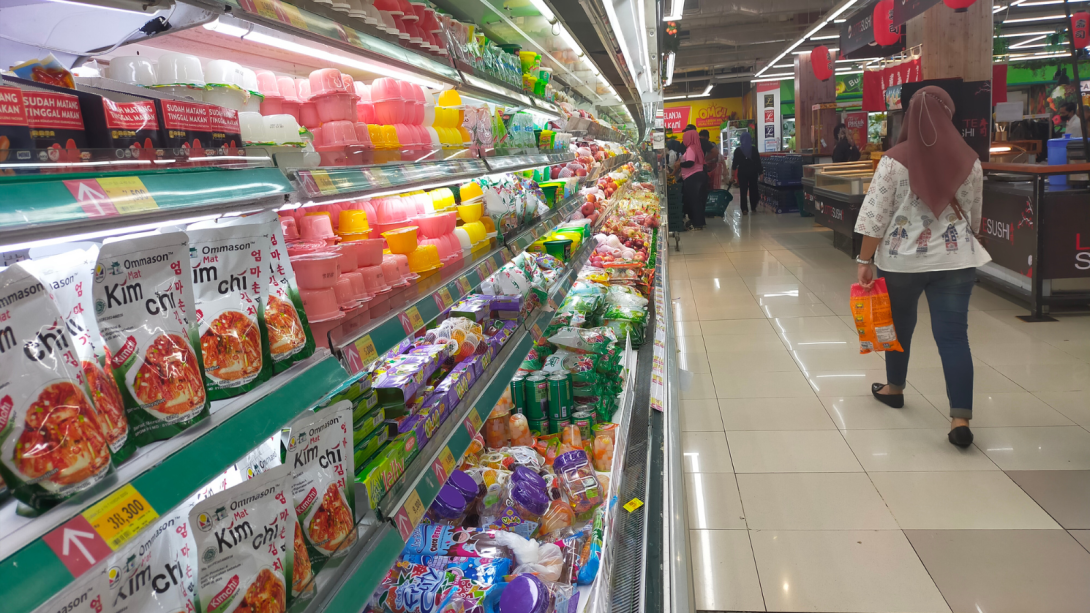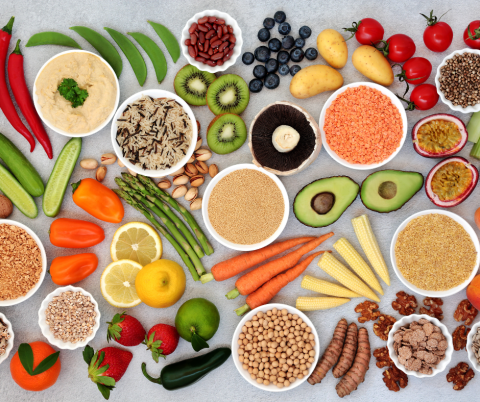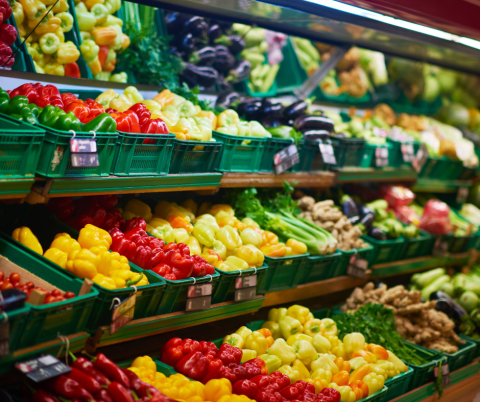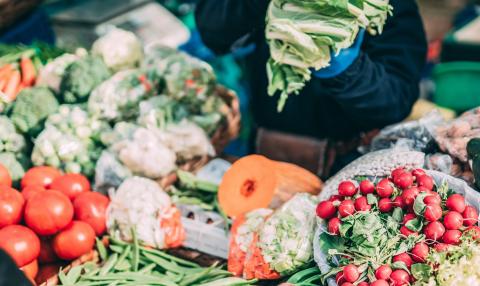08 May 2025
Why UK retailers' climate commitments are failing to deliver and how to fix it

Commitment issues: Why UK retailers’ climate commitments are failing to deliver and what can be done to fix it
A new report by Feedback, with support from The Food Foundation, analysing a decade of public commitments by the 10 largest UK supermarkets on climate, environment, and health shows that, without strong regulatory frameworks, the retail sector is struggling to deliver on its promises.
Successive governments have relied on the food industry to set ‘voluntary’ targets, act and report on their progress; however, these have largely failed to carry through.
This matters because the food sector accounts for approximately 35% of the UK’s greenhouse gas emissions, and the UK’s food retail sector plays a pivotal role in advancing national climate and biodiversity goals, protecting people and nature from the growing impacts of climate change.
Five key findings from the report:
- Over a decade’s worth of commitments on climate and environment by the UK’s supermarkets – adding up to 600 commitments in total – are failing to translate to sufficient progress or public transparency
- Voluntary agreements and individual company pledges are fragmented, inconsistent, and poorly enforced, enabling companies to make public commitments to future goals without any guarantee of adequate or timely action
- Target-setting and reporting was highly inconsistent between retailers, making a clear case for government regulation to level the playing field: while Co-op set 104 targets, Iceland set only 15.
- Regulation is now overdue to standardise and enforce climate and environment commitments, particularly in monitoring Scope 3 emissions and promoting sustainable diets, in line with Climate Change Committee (CCC) recommendations
- The UK food retail sector must undergo a fundamental transformation to meet its climate and environment commitments. The government’s forthcoming food strategy is critical for ensuring the UK’s food system delivers for both health and the environment and must ensure that consistent and mandatory standards are set and enforced for all major food businesses. Without this, as industry executive whistleblowers recently put it, the sector is heading for economic disaster ‘bigger than the pandemic’ and major threats to food security.
This report finds that of 57 individual retailer commitments on healthy and sustainable diets, only just over half include measurable targets with a target percentage and year. While best practice is to set volume-based (tonnage) sales targets, only four retailers have done so.
This is a clear example where the setting of own targets is insufficient and obscures a concerning lack of substance and delivery.
One of the commitment areas retailers are failing to deliver on is on reducing scope 3 emissions, which account for a large proportion of food businesses overall emissions.
The CCC predicts agriculture will be the highest emitting UK sector by 2050. To help to curb this, it recommends reducing meat and dairy consumption, which would also contribute to better health outcomes and the equivalent of nearly £1 billion in health benefits.
Supermarkets account for 95% of UK food sales and wield significant influence over both production and consumption patterns. Around half of supermarkets’ overall emissions are linked to meat and dairy sales (Madre Brava, 2024), however, most retailers have yet to sufficiently demonstrate how they plan to address this challenge.
These findings are supported by our annual Plating Up Progress analysis, which shows that Lidl GB is the only retailer with a target to increase sales of plant-based protein as a proportion of total protein sales.
As well as businesses reducing meat and dairy sales, the CCC says this shift in consumption would need to rely on an active shift in the availability and pricing of plant-based alternatives to meat and dairy.
Along with other targeted policies, these actions would help to boost the uptake of healthy and sustainable plant-rich diets in the UK, as highlighted by Low Hanging Fruit, a new policy pathway by The Food Foundation, Green Alliance and GFI Europe.
There is currently a way to go on this; retailer promotions on meat and dairy far outweigh the proportion of multibuy and price promotion deals on fruit and vegetables.
Data featured in our latest State of the Nation’s Food Industry report from six major retailers (Aldi, Asda, Iceland, Morrisons, Sainsbury’s and Tesco) from March 2024 finds that over one in 10 (13%) of store-wide price promotions are on meat and dairy products, of which 4.6% of offers were on processed meat products.
This compares to 7.4% of promotions going towards fruit and vegetables. The picture is worse for multibuy deals: 18% of multibuy deals are on meat and dairy products, with 10.6% of all deals on processed meat, compared to just 5.3% of deals on fruit and vegetables.
Plant-based alternatives generally come with a price premium; currently, plant-based milks cost on average 55% more than dairy milk and plant-based meat alternatives can be 73% more expensive than equivalent meat products (The Food Foundation, 2025; The Food Foundation, 2024).
This may put these options out of reach for those on lower incomes, with research already suggesting that in the UK high income households are more likely to purchase plant-based alternatives than those on a lower income (Alae-Carew et al., 2022).
What needs to happen?
Mandatory public reporting by all large food businesses on a range of key health and sustainability metrics is critical for driving transparency and ensuring that there is a level playing field for all food businesses.
This would de-risk investment in more healthy and sustainable food offerings and could build on the Food Data Transparency Partnership and the International Sustainability Standards Board (ISSB) standards.
Having sector-wide data would also allow for more informed policy decisions – Government would be able to more accurately evaluate the likely impacts of current and new policies on food supply and track progress towards population-level health and sustainability goals.
Mandatory reporting should include standardised disclosure on Scope 3 emissions, the proportion of sales coming from healthier foods, and the proportion of protein sales coming from animal versus plant proteins.
Businesses should also look to set measurable, SMART targets for shifting sales towards more healthy and sustainable dietary patterns. Leadership is already emerging among businesses (albeit slowly in the absence of government incentives).
Conclusion
While voluntary initiatives have laid important groundwork in this space and demonstrated what is possible, they remain insufficient in delivering the scale and urgency of change required.
Retailers play a pivotal role in driving supply chain accountability, but without clear regulatory frameworks, progress remains inconsistent, opaque, and ultimately inadequate.
The UK has an opportunity, through the planned Food Strategy, to lead the way in sustainable trade and food system transformation, but only if policymakers act decisively to put their mark on food policy.
The Food Strategy should end the era of voluntary agreements, as part of a wider approach to regulations that ensures the UK food and agriculture sector meets national climate, environment and health goals.
- Find Feedback’s Commitment Issues report here
- Find out more about Plating Up Progress here
- Read the latest State of the Nation’s Food Industry report here
- Also see: Eating Better’s briefing ‘The case for mandatory action to achieve transformational change in UK food’ here
References:
Alae-Carew C., Green R., Stewart C., Cook B., Dangour AD., Scheelbeek PFD (2022). The role of plant-based alternative foods in sustainable and healthy food systems: Consumption trends in the UK. Sci Total Environ. 807(Pt 3):151041. doi: 10.1016/j.scitotenv. 2021.151041. Epub 2021 Oct 18. PMID: 34673070; PMCID: PMC8724617.
Madre Brava (2024). Europe’s top supermarkets race towards plant-rich diets - but the finish line is far. Media briefing. https://madrebrava. org/media/pages/insight/11fd194bc7-1724333852/madre_ brava_briefing_proteintransition_race_retailer_eng.pdf
The Food Foundation (2025). The Broken Plate 2025: The State of the Nation’s Food System. https://foodfoundation.org.uk/sites/default/files/2025-04/TFF_The%20Broken%20Plate%202025.pdf
The Food Foundation (2024). Rethinking Plant-Based Meat Alternatives. What are the best plant-based options for 'meat-ing' health, environmental and affordability objectives? https://foodfoundation.org.uk/publication/rethinking-plant-based-meat-alternatives






